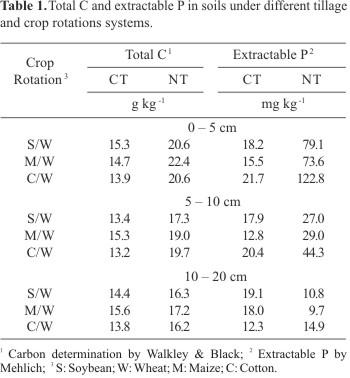Agricultural practices that reduce soil degradation and improve agricultural sustainability are needed particularly for tropical/subtropical soils. No-tillage planting causes minimal soil disturbance and combined with crop rotation may hold potential to meet these goals. Soil enzyme activities can provide information on how soil management is affecting the potential to perform the processes in soils such as decomposition and nutrient cycling. Soil enzyme activities were investigated in a split-plot experiment (3 replications) where tillage (no till and conventional) was the main plot and crop rotation (soybean/wheat, S/W; maize/wheat, M/W or cotton/wheat, C/W) was the subplot. The experiment was established in 1976 in southern Brazil. Soil samples were taken at 0-5, 5-10 and 10-20 cm depths in 1997 and 1998. The 0-5 cm layer under NT system showed increases up 68% for amylase, 90% for cellulase, 219% for arylsulfatase, 46% for acid phosphatase, and 61% for alkaline phosphatase. There were significant correlations of soil enzyme activities with total organic C, and C and N microbial biomass. These results showed that NT increased microbial activity and that soil enzyme activity is a sensitive indicator of alteration soil quality by management.
enzyme activities; tillage systems; crop rotation; soil management; soil quality



